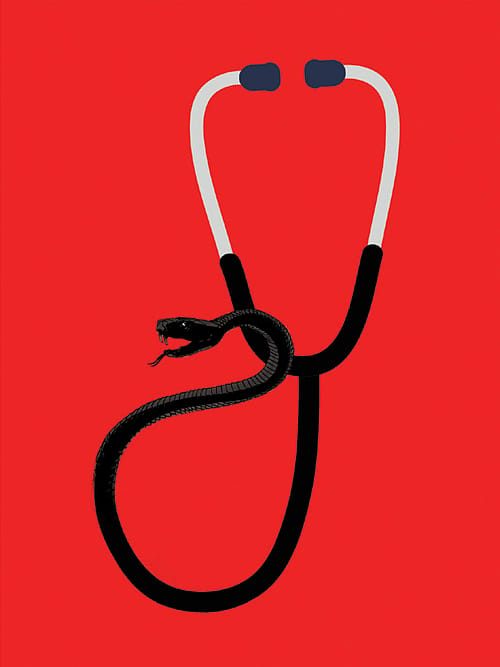Beyond Band-Aids

THIS BOOK, WITH its provocative title, has got the medical community by its ears, while the public doesn't know whether to nod in covert agreement, or shake off such a scandalous allegation. The book launch was akin to the throwing of a gauntlet, but rather than put up a fight, the fraternity has gone into a prolonged fit of the sullens. This might defeat the purpose of the book, which, other than its sensational title, is an extremely serious body of work. It is a collection of essays by leaders across disciplines, and is packed with complex and intelligent arguments, worth copious study; if the title caused one to expect a tray of hors d'oeuvres, let the reader be prepared to chew on a year's supply of cerebral protein.
With healthcare corruption in India as its central theme, the book is divided into eight sections, offering essays on a wide array of topics from corruption in practice to legal issues and consequences, and governance. The 41 essays, or any one of the eight sections could easily offer enough material for an individual review; so one review for this comprehensive treatise is insufficient. The book is a 'must read' for various stakeholders from doctors to social scientists to economists, because any attempt to unravel the problem of healthcare corruption in India must include an understanding of social sciences and globalisation.
2026 Forecast
09 Jan 2026 - Vol 04 | Issue 53
What to read and watch this year
Nobel laureate Amartya Sen's foreword sets the record straight by stating that the political claim of a shining India is overshadowed by the country's poor achievements in health. He points out three general failures in healthcare: an 'amazing neglect of primary healthcare', 'India's hasty and premature reliance on private healthcare', and thirdly, a deficiency of public discussion on healthcare. This book provides suggestions on how the beast of corruption in this sector can be defanged and disembodied.
The heart of the matter has been nailed by the stylish sleight of Shiv Viswanathan's prose in the second essay. He writes, 'Corruption is basically the illegitimate use of public goods for private ends' and 'corruption subverts the idea that the individual is the locus of ethics'; taken together, the statements do impute responsibility to the individual, but in conjunction with personal integrity, suggesting that societal networks and the institutional milieu must form the necessary grid for ethical behaviour. Therefore, governments must safeguard public goods, and policymakers must prevent an overrun of healthcare by market forces.
The second section enumerates the sad saga of corruption, starting with the supposed custodian of ethical healthcare, the Medical Council of India, going on to the monetary sale of medical seats, corruption in everyday practice, hospitals and the health services. This section includes essays on corruption in small-town NGOs, the power of money in buying organs, and underlines the ubiquity of corruption in the public sector, medical research and even technology.
The third part is a philosophical lens on the broad issue under discussion, and points to the basic disease, a degradation of our spiritual, ethical and moral heritage, which has resulted in corruption as a symptom. If the individual doctor had not forgotten his primary calling as a healer, he would have resisted the system that looked at his patient as a source of profit.
Section four opens with an essay by David Berger whose serendipitous stay in the Himalayan foothills threw open some of the dark secrets of healthcare in India, of kickbacks and corruption. His articles in The BMJ became a rallying point for a few early crusaders of the cause, and in some ways spurred this book.
The next sections, covering the importance of governance, contain a few personal essays and two major scandals. As no reader likes a sad ending, the editors have put together a selection of the best of human endeavour in the last section, of reaching out to the most vulnerable, of creating paradigms of hope, and of courageous challenges posed to the powers that be.
This book is worth several reads, and reminds us that the doctor should be empowered to make ethical decisions at an individual as well as at the institutional level. The predator needs to be what s/he was meant to be: a gentle healer.
